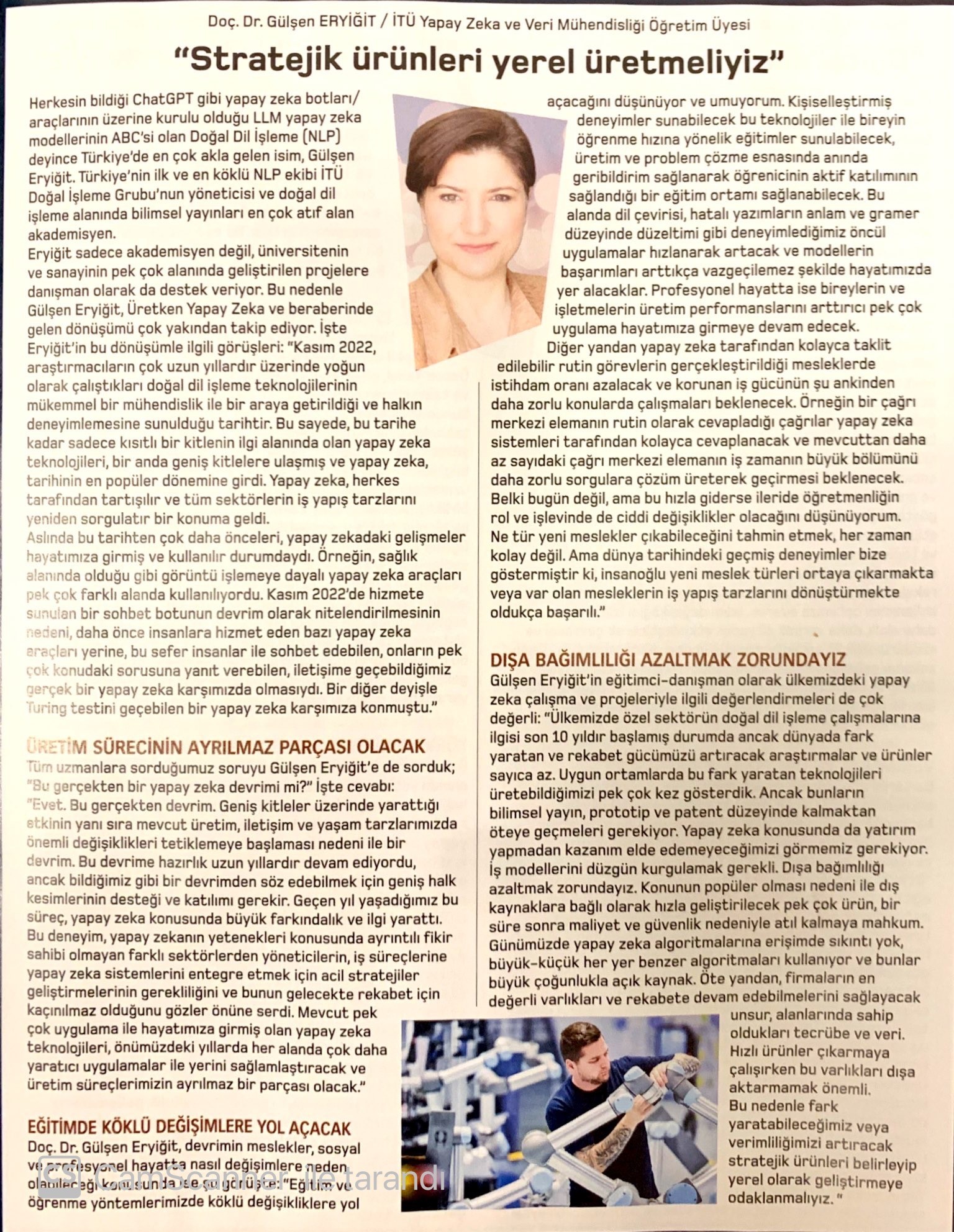In this week's issue of Para Magazine, our coordinator Gülşen Eryiğit talked about generative AI.
ARA YAPAY ZEKA/ ŞULE GÜNER 30 Kasım 2022. Bu tarih, dünyanın şimdiye kadar yaşadığı en büyük milat olabilir. Zira önce küçük bir girişim olarak 2015'te yola çıkan OpenAI, 2022'de "kamuoyunun kullanımına açacak kadar" olgunlaşan ChatGPT asistanını dünyaya duyurdu. İlk dokuz ayda 100 milyon kullanıcıya ulaştı. Ve böylece Üretken Yapay Zeka, lügatımıza ve hayatımıza girdi. Artık ne insan hayatı ne iş hayatı aynı olacaktı. Ve aradan bir yıl geçti. Biz yapay zekanın hayatımızı tümüyle değiştireceğini anlamış durumdayız. Şu veri bile yapay zekanın gücünü gösteriyor; Bloomberg'de belirtildiğine göre 2022'de 40 milyar dolar olan yapay zeka pazarının 2032'de 1,4 trilyon dolarlık pazara sahip olması bekleniyor.
Bu gelişme, yapay zekanın şimdiye kadar insan hayatının her alanına dahil olmasından çok daha fazla şey ifade ediyor. Artık sadece teknolojik olarak tanımlayamayacağımız yapay zekanın etkisi, elektriğin bulunmasından da sanayi devriminden de büyük olacak. Tüm uzmanlar bu konuda hemfikir...
İTÜ Yapay Zeka ve Veri Mühendisliği Öğretim üyesi Doç. Dr. Gülşen ERYİĞİT
"Stratejik ürünleri yerel üretmeliyiz"
Herkesin bildiği ChatGPT gibi yapay zeka botları/araçlarının üzerine kurulu olduğu LLM yapay zeka modellerinin ABC'si olan Doğal Dil İşleme (NLP) deyince Türkiye'de en çok akla gelen isim, Gülşen Eryiğit. Türkiye'nin ilk ve en köklü NLP ekibi İTÜ Doğal İşleme Grubu'nun yöneticisi ve doğal dil işleme alanında bilimsel yayınları en çok atıf alan akademisyen.
Eryiğit sadece akademisyen değil, üniversitenin ve sanayinin pek çok alanında geliştirilen projelere danışman olarak da destek veriyor. Bu nedenle Gülşen Eryiğit, Üretken Yapay Zeka ve beraberinde gelen dönüşümü çok yakından takip ediyor. İşte Eryiğit'in bu dönüşümle ilgili görüşleri:
"Kasım 2022, araştırmacıların çok uzun yıllardır üzerinde yoğun olarak çalıştıkları doğal dil işleme teknolojilerinin mükemmel bir mühendislik ile bir araya getirildiği ve halkın deneyimlemesine sunulduğu tarihtir. Bu sayede, bu tarihe kadar sadece kısıtlı bir kitlenin ilgi alanında olan yapay zeka teknolojileri, bir anda geniş kitlelere ulaşmış ve yapay zeka, tarihinin en popüler dönemine girdi. Yapay zeka, herkes tarafından tartışılır ve tüm sektörlerin iş yapış tarzlarını yeniden sorgulatır bir konuma geldi.
Aslında bu tarihten çok daha önceleri, yapay zekadaki gelişmeler hayatımıza girmiş ve kullanılır durumdaydı. Örneğin, sağlık alanında olduğu gibi görüntü işlemeye dayalı yapay zeka araçları pek çok farklı alanda kullanılıyordu. Kasım 2022'de hizmete sunulan bir sohbet botunun devrim olarak nitelendirilmesinin nedeni, daha önce insanlara hizmet eden bazı yapay zeka araçları yerine, bu sefer insanlar ile sohbet edebilen, onların pek çok konudaki sorusuna yanıt verebilen, iletişime geçebildiğimiz gerçek bir yapay zeka karşımızda olmasıydı. Bir diğer deyişle Turing testini geçebilen bir yapay zeka karşımıza konmuştu."
ÜRETİM SÜRECENİN AYRILMAZ PARÇASI OLACAK
Tüm uzmanlara sorduğumuz soruyu Gülşen Eryiğit'e de sorduk; "Bu gerçekten bir yapay zeka devrimi mi?" İşte cevabı:
"Evet. Bu gerçekten devrim. Geniş kitleler üzerinde yarattığı etkinin yanı sıra mevcut üretim, iletişim ve yaşam tarzlarımızda önemli değişiklikleri tetiklemeye başlaması nedeni ile bir devrim. Bu devrime hazırlık uzun yıllardır devam ediyordu, ancak bildiğimiz gibi bir devrimden söz edebilmek için geniş halk kesimlerinin desteği ve katılımı gerekir. Geçen yıl yaşadığımız bu süreç, yapay zeka konusunda büyük farkındalık ve ilgi yarattı. Bu deneyim, yapay zekanın yetenekleri konusunda ayrıntılı fikir sahibi olmayan farklı sektörlerden yöneticilerin, iş süreçlerine yapay zeka sistemlerini entegre etmek için acil stratejiler geliştirmelerinin gerekliliğini ve bunun gelecekte rekabet için kaçınılmaz olduğunu gözler önüne serdi. Mevcut pek çok uygulama ile hayatımıza girmiş olan yapay zeka teknolojileri, önümüzdeki yıllarda her alanda çok daha yaratıcı uygulamalar ile yerini sağlamlaştıracak ve üretim süreçlerimizin ayrılmaz bir parçası olacak."
EĞİTİMDE KÖKLÜ DEĞİŞİMLERE YOL AÇACAK
Doç. Dr. Gülşen Eryiğit, devrimin meslekler, sosyal ve profesyonel hayatta nasıl değişimlere neden olabileceği konusunda ise şu görüşte:
"Eğitim ve öğrenme yöntemlerimizde köklü değişikliklere yol açacağını düşünüyor ve umuyorum. Kişiselleştirmiş deneyimler sunabilecek bu teknolojiler ile bireyin öğrenme hızına yönelik eğitimler sunulabilecek, üretim ve problem çözme esnasında anında geribildirim sağlanarak öğrenicinin aktif katılımının sağlandığı bir eğitim ortamı sağlanabilecek. Bu alanda dil çevirisi, hatalı yazımların anlam ve gramer düzeyinde düzeltimi gibi deneyimlediğimiz öncül uygulamalar hızlanarak artacak ve modellerin başarımları arttıkça vazgeçilemez şekilde hayatımızda yer alacaklar. Profesyonel hayatta ise bireylerin ve işletmelerin üretim performanslarını arttırıcı pek çok uygulama hayatımıza girmeye devam edecek.
Diğer yandan yapay zeka tarafından kolayca taklit edilebilir rutin görevlerin gerçekleştirildiği mesleklerde istihdam oranı azalacak ve korunan iş gücünün şu ankinden daha zorlu konularda çalışmaları beklenecek. Örneğin bir çağrı merkezi elemanın rutin olarak cevapladığı çağrılar yapay zeka sistemleri tarafından kolayca cevaplanacak ve mevcuttan daha az sayıdaki çağrı merkezi elemanın iş zamanın büyük bölümünü daha zorlu sorgulara çözüm üreterek geçirmesi beklenecek. Belki bugün değil, ama bu hızla giderse ileride öğretmenliğin rol ve işlevinde de ciddi değişiklikler olacağını düşünüyorum. Ne tür yeni meslekler çıkabileceğini tahmin etmek, her zaman kolay değil. Ama dünya tarihindeki geçmiş deneyimler bize göstermiştir ki, insanoğlu yeni meslek türleri ortaya çıkarmakta veya var olan mesleklerin iş yapış tarzlarını dönüştürmekte oldukça başarılı."
DIŞA BAĞIMLILIĞI AZALTMAK ZORUNDAYIZ
Gülşen Eryiğit'in eğitimci-danışman olarak ülkemizdeki yapay zeka çalışma ve projeleriyle ilgili değerlendirmeleri de çok değerli:
"Ülkemizde özel sektörün doğal dil işleme çalışmalarına ilgisi son 10 yıldır başlamış durumda ancak dünyada fark yaratan ve rekabet gücümüzü artıracak araştırmalar ve ürünler sayıca az. Uygun ortamlarda bu fark yaratan teknolojileri üretebildiğimizi pek çok kez gösterdik. Ancak bunların bilimsel yayın, prototip ve patent düzeyinde kalmaktan öteye geçmeleri gerekiyor. Yapay zeka konusunda da yatırım yapmadan kazanım elde edemeyeceğimizi görmemiz gerekiyor. İş modellerini düzgün kurgulamak gerekli. Dışa bağımlılığı azaltmak zorundayız. Konunun popüler olması nedeni ile dış kaynaklara bağlı olarak hızla geliştirilecek pek çok ürün, bir süre sonra maliyet ve güvenlik nedeniyle atıl kalmaya mahkum. Günümüzde yapay zeka algoritmalarına erişimde sıkıntı yok, büyük-küçük her yer benzer algoritmaları kullanıyor ve bunlar büyük çoğunlukla açık kaynak. Öte yandan, firmaların en değerli varlıkları ve rekabete devam edebilmelerini sağlayacak unsur, alanlarında sahip oldukları tecrübe ve veri. Hızlı ürünler çıkarmaya çalışırken bu varlıkları dışa aktarmamak önemli. Bu nedenle fark yaratabileceğimiz veya verimliliğimizi artıracak stratejik ürünleri belirleyip yerel olarak geliştirmeye odaklanmalıyız. "
